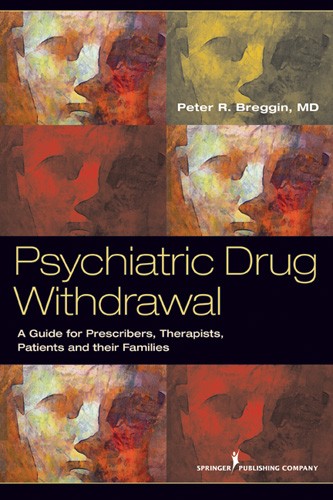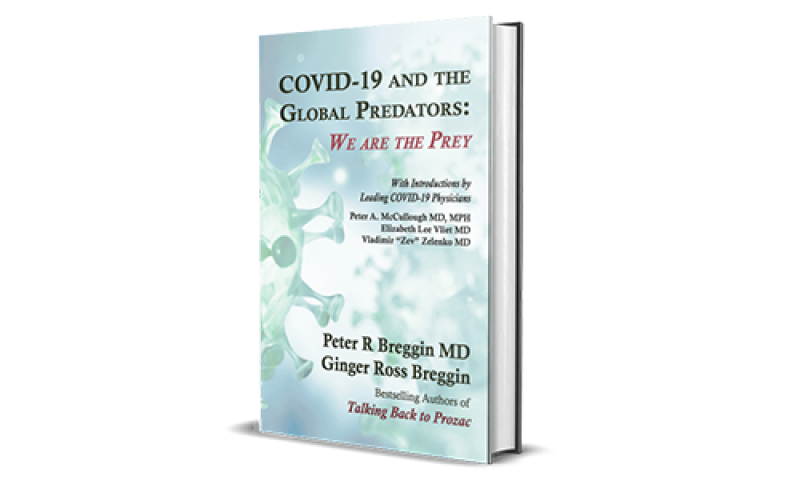Dr. Peter Breggin’s Antidepressant Drug Resource and Information Center
For Prescribers, Scientists, Professionals, Patients and their Families
Scientific Articles by Category
Introduction by Peter R. Breggin, MD
Antidepressants: Far More Harm than Good
Antidepressant Neurotoxicity
Antidepressants are neurotoxic, that is, they harm the brain and disrupt its functions. As a result, they cause innumerable kinds of abnormal thinking and behaviors, including mania, suicide and violence. In the process, they cause detectable damage to the brain of the child or adult, and also to the fetus of pregnant mothers who take the drug (See Scientific Section 9).
The antidepressant drugs have no specific impact on depression and instead are used off label to treat everything imaginable from physical pain to anxiety and ADHD. People often experience euphoria after starting an antidepressant, but it is short-lived, leaving the individual to try one and then another antidepressant in the hope of re-experiencing this artificial, chemically induced “happiness.” This initial “feeling great” is in reality a danger sign, often signaling the start of an antidepressant-induced manic episode that can ruin lives. Antidepressant-induced mania is largely indistinguishable from spontaneous mania, and varies in intensity from mild to psychotic. It can include bizarre destructive behaviors, impulsivity, sexual acting out, callousness, grandiosity, and very bad judgment. Antisocial behavior is common. Extreme irritability can lead otherwise loving people to become hateful and violent. Loss of judgment can cause ethical people to act like criminals (See Scientific Sections 1-7).
With or without mania, antidepressants often cause a worsening of the individual’s condition, with “crashing” into depression and suicide. Suicidality in children and young adults has been demonstrated in short-term clinical trials conducted by drug companies for FDA approval. (Scientific Section 6, see Black Box Warnings at top of Full Prescribing Information for all antidepressants). These very short, drug-company manipulated studies are poor indicators for suicide or violence, and other clinical and epidemiological studies have confirmed that antidepressants cause suicidality and violent behavior in all age groups (Scientific Sections 3 and 4).
The harmful mental and behavioral effects of antidepressants are especially prevalent and severe in children and youth with up to 50% afflicted with reactions such as motor restlessness, sleep disturbance, social disinhibition or a subjective sensation of excitation. (See Science Section 5, including Riddle et al., 1990, for 50% figure, and King et al. 1991 for severity of cases). A great deal of behavior described as “bad” or “antisocial” is in reality driven by antidepressants.
Detailed descriptions and analyses of these unfortunate outcomes are presented in my book, Medication Madness: the Role of Psychiatric Drugs in Cases of Violence, Suicide and Crime. In the book, I review 50 real-life cases based on extensive information on each individual drawn from my forensic work and clinical practice. Additionally information about these tragic antidepressant adverse drug reactions is provided in dozens of individual scientific articles made available on this resource center.
The official American Psychiatric Association Diagnostic and Statistical Manual of Mental Disorders (DSM) in the descriptions of manic episodes affirms in every recent edition that antidepressants can cause the full range of mania, from a few symptoms to gross cases. The DSM-IV-TR (2000) states, “Symptoms like those seen in a Manic Episode may also be precipitated by antidepressant treatment such as medication, electroconvulsive therapy, or light therapy” (p. 361). The latest edition, DSM-V (2013), has a more lengthy discussion of mania and manic-like symptoms caused by antidepressants (p. 129). In both editions, the sections on diagnosing mania and bipolar disorder require differentiating these syndromes from the identical symptoms caused by antidepressant drugs.
The official Full Prescribing Information (also called the ‘label’ or the ‘package insert’) for antidepressants describes multiple adverse effects in the sections on Warnings, Precautions and Adverse Effects. The material in the Warnings and Precautions section is part of the class label for all antidepressants and therefore appears in almost identical language in the Full Prescribing Information section of every antidepressant drug label (see Scientific Sections 6 & 12). The 2014 Lexapro Full Prescribing Information (see Scientific Section 12), for example, states:
All patients being treated with antidepressants for any indication should be monitored appropriately and observed closely for clinical worsening, suicidality, and unusual changes in behavior, especially during the initial few months of a course of drug therapy, or at times of dose changes, either increases or decreases.
The following symptoms, anxiety, agitation, panic attacks, insomnia, irritability, hostility, aggressiveness, impulsivity, akathisia (psychomotor restlessness), hypomania, and mania, have been reported in adult and pediatric patients being treated with antidepressants for major depressive disorder as well as for other indications, both psychiatric and nonpsychiatric. p. 6
Note the enormous range of symptoms and disorders caused by antidepressants. Most of the above symptoms are related to and can lead to mania, violence or suicide. That these adverse drug reactions can occur in nonpsychiatric patients confirms that the drug is the culprit and not that patient’s own emotional problems. They are commonly mistaken for the patient’s emotional problems instead of being correctly identified as adverse drug reactions. They can occur in mild or severe forms. Note that the highest risk is around the time of the starting the drug or dose changes, up or down.
In the long-run, antidepressants, like almost all psychiatric drugs, lead to apathy, indifference, and lack of caring. Emotional life is dulled and relationships lack empathy and love. Some patients become so dulled that they develop a gross apathy syndrome (See Scientific Section 4). Long term, antidepressants also produce a dysphoria syndrome, with varied painful emotions that the doctors and patients mistakenly attribute to the patient’s “mental disorder” (El-Mallakh et al. in Scientific Section 4). These drugs suppress both sexuality and love, often without full recovery when the drugs are stopped (See Scientific Section 11).
Most people continue to take antidepressants because they fail to perceive their loss of quality of life (see Breggin, 2006d, on medication spellinbinding in Scientific Section 7). Also, when many patients try to stop taking their drugs, the withdrawal syndrome produces such torture-like emotional and physical reactions that they think they need to keep taking the medication to control their “mental illness.” In reality, they need a slow tamper with careful, experienced supervision (See Scientific Section 10, and my book Psychiatric Drug Withdrawal: A Guide for Prescribers, Therapists, Patients and their Families).
Antidepressants Are Ineffective, and Do More Harm than Good
All the citations that follow are in Scientific Section 8.
According to FDA regulations, drug companies only need to produce two studies to demonstrate the effectiveness of a drug; but they can try as many times as they wish. This is an unscientific methodology that corrupts the research process. If a drug fails to help in six studies and succeeds in two, it has not been proven effective; but the FDA will call it effective. Kirsch et al. (2008) reviewed all the antidepressant double-blind placebo-controlled clinical trials conducted during the FDA approval process, not just those that were cherry-picked to gain approval. In addition, the studies are totally controlled by the drug companies with little or no oversight by the FDA and they are very short in duration, typically 3-8 weeks long. On the basis of evaluating all the studies, Kirsh et al. concluded that antidepressants are ineffective (also see Antonuccio et al., 1999; and Jureidini 2004 for children).
The largest antidepressant trials ever conducted, the government sponsored STAR*D study, found that only 2.7 percent of patients (108 of 4041) had an initial remission that lasted or could be followed up for 12 months (Pigott, 2015; Pigott et al., 2011). The study demonstrated an overall lack of effectiveness..
Thomas Insel, the former Director of the National Institute of Mental Health (NIMH), in December 2011 confessed in his official government blog that antidepressants are virtually useless: ‘‘The bottom line is that these medications appear to have a relatively small effect in patients broadly classified as having depression.’’ He meant a small therapeutic effect. By contrast, the adverse effects are numerous and potentially devastating and even deadly.
There are many therapeutic interventions and real-life alternatives for helping people overcome depression, spanning the spectrum from running and healthy eating to mindfulness training and psychotherapy. I have reviewed these in some of my other articles (e.g., Breggin, 2016, in Scientific Section 7). I am not focusing on better alternatives in this resource center, because overall, antidepressants do far more harm than good in children and adults, and therefore should not be prescribed. Even if more effective treatments or approaches did not exist, antidepressants, by doing more harm than good, are too dangerous for clinical use. My best book for helping overcome stressful circumstances and negative, self-defeating emotions is Guilt, Shame and Anxiety: Understanding and Overcoming Negative Emotions.
| WARNING: Psychiatric drugs are not only dangerous to take, they are also dangerous to withdraw from. Withdrawal from psychiatric drugs, including antipsychotic drugs, should be done cautiously with professional supervision.Please see my book, Peter R. Breggin, MD, Psychiatric Drug Withdrawal: A Guide for Prescribers, Therapists, Patients and their Families. |

